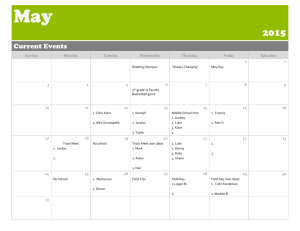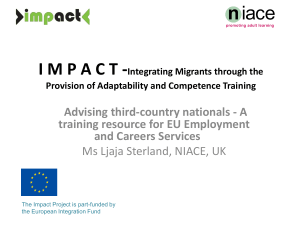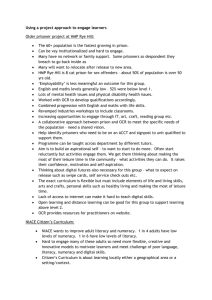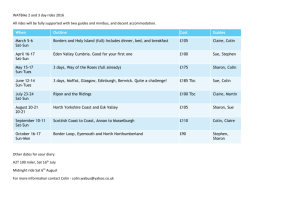report of the third ni impact form meeting
advertisement
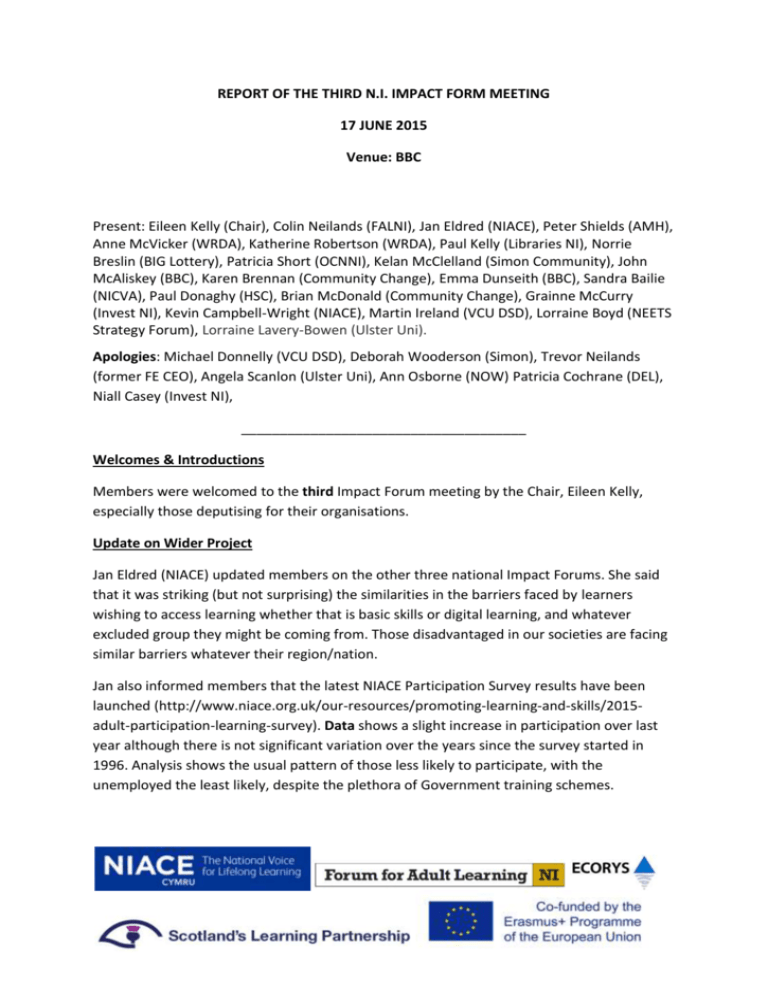
REPORT OF THE THIRD N.I. IMPACT FORM MEETING 17 JUNE 2015 Venue: BBC Present: Eileen Kelly (Chair), Colin Neilands (FALNI), Jan Eldred (NIACE), Peter Shields (AMH), Anne McVicker (WRDA), Katherine Robertson (WRDA), Paul Kelly (Libraries NI), Norrie Breslin (BIG Lottery), Patricia Short (OCNNI), Kelan McClelland (Simon Community), John McAliskey (BBC), Karen Brennan (Community Change), Emma Dunseith (BBC), Sandra Bailie (NICVA), Paul Donaghy (HSC), Brian McDonald (Community Change), Grainne McCurry (Invest NI), Kevin Campbell-Wright (NIACE), Martin Ireland (VCU DSD), Lorraine Boyd (NEETS Strategy Forum), Lorraine Lavery-Bowen (Ulster Uni). Apologies: Michael Donnelly (VCU DSD), Deborah Wooderson (Simon), Trevor Neilands (former FE CEO), Angela Scanlon (Ulster Uni), Ann Osborne (NOW) Patricia Cochrane (DEL), Niall Casey (Invest NI), _____________________________________ Welcomes & Introductions Members were welcomed to the third Impact Forum meeting by the Chair, Eileen Kelly, especially those deputising for their organisations. Update on Wider Project Jan Eldred (NIACE) updated members on the other three national Impact Forums. She said that it was striking (but not surprising) the similarities in the barriers faced by learners wishing to access learning whether that is basic skills or digital learning, and whatever excluded group they might be coming from. Those disadvantaged in our societies are facing similar barriers whatever their region/nation. Jan also informed members that the latest NIACE Participation Survey results have been launched (http://www.niace.org.uk/our-resources/promoting-learning-and-skills/2015adult-participation-learning-survey). Data shows a slight increase in participation over last year although there is not significant variation over the years since the survey started in 1996. Analysis shows the usual pattern of those less likely to participate, with the unemployed the least likely, despite the plethora of Government training schemes. Report from the Working Group Colin Neilands spoke to the report of the group which had been circulated to members. There was general approval of the format and content suggested. In discussion the following points also arose: Jan shared a report based on research carried out by young people on what employers are looking for. This will be available from the NIACE website on 1st July. NIACE produced a manifesto for the Westminister elections this year and this could be of use in preparing a manifesto here before the 2016 Assembly elections. Paul Donaghy supported the move to engage with local councils. He also asked if in advance of the October conference participants might be sent a summary of the findings/recommendations of the Inquiry into the Future of Lifelong Learning (Learning Through Life Tom Schuller and David Watson 2009 - downloadable at http://www.niace.org.uk/our-resources/life-and-society/learning-through-life). Paul also spoke of how Government is struggling to shift from a silo-funded activities to impact-focussed outcomes. Learning is frequently the enabler that can support such desired impacts. in response to Paul raising Social Return on Investment for adult learning, Jan shared the example of a pilot Citizen's Curriculum programme in Rochdale where an investment of £35K generated a fiscal return of £69k. The conference should present adult learning as offering effective, creative solutions that Government needs. Acknowledging that having the 'right' audience will be critical, members identified key individuals who they know. Colin will use these for the general invite list, but members are also asked to use their personal relationships to encourage engagement. Colin will keep members updated on the design of the conference and any further assistance that they might be able to offer to make it achieve its desired impact. Thematic Discussion - Digital Skills and E-Learning Papers were presented by Kevin Campbell-Wright (NIACE), Grainne McCurry (Invest NI) and Emma Dunseith (BBC) - see Appendix. Forum Discussion Members broke into small groups to react to what they had heard and to address these issues/questions - examples of good practice and possible opportunities for development; what could the Impact Forum do to help members and others develop e-learning? Feedback still not the ideal medium for everyone - not one that is seen as natural by everyone important to identify hooks by which people can be engaged - through their interests or through need there is often accidental learning - learning that is not identified as such but is accrued through following personal curiosity or seeking to help others - in seeking information an adult can acquire knowledge and skills around using search engines, for example. So this can be a challenge to adult learning providers to think about how learning is defined and understood, by ourselves and the general public important to remember that digital learning can be through a range of access points - PCs, tablets and smart phones providers need to think more about blended learning - digital as a methodology and not just a narrow skills-based programme making this learning fun and relevant to their interests can help overcome some people's fears some young people can have confidence in using digital technology as available via their phones, but not be confident or skilled in work on a computer many older people remain to be convinced of the need to acquire digital skills (relying on family members to assist them when needed). There again for many older people cost and accessibility are significant barriers. there remain areas of Northern Ireland where the quality of access to broadband is poor one thing the IF and its members could do is to share best practice - even within the membership of the IF there are resources that would be valuable to others we need to promote positive messages about digital learning, especially to those to whom it remains alien and scary digital champions comparable with learning or health champions could help reinforce such messages. Inspiring Impact Sandra Baillie (NICVA) gave a presentation (attached) on the Inspiring Impact project in Northern Ireland. This is part of a UK-wide initiative - see www.inspiringimpact.org and www.inspiringimpactni.org - where there are many examples of projects and access to a wide variety of tools to assist this significant shift across many interest areas. This is working to support a cultural shift in the community/voluntary sector and its funders to place impact at the core of operational design as well as assessment. This should be part of a learning cycle and encourages the sharing of not just what worked well but also what didn't work. At the core is the need to always ask - 'so what?' - the target of 15 courses and 150 learners was reached, but so what? what impact did this action have? This approach is particularly challenging in that impact is long-term, but most funding is short-term and many organisations are not in a position to think of years down the line. However the opportunity it presents is to work with others around impact, because your particular intervention will always have wider implications/results - e.g. our inputs in terms of adult learning will have impact in terms of improving health and well-being for individuals and communities and so links us to the providers of other services - and vice versa - creating common desired impacts. Should the IF and Inspiring Impact secure further funding we should explore ways of working together. UK EAAL Conference Colin shared practical information on the Sept conference and encouraged members to attend. He also explained the financial assistance that could be available to support those from less well resourced organisations. Colin explained that the format and content of the conference is not yet fixed and so the exact nature of the input from the NI IF still needs to be agreed. Jan shared her idea about a 4 nations panel to show the similarities and differences that exist across the different jurisdictions. Paul Donaghy said that part of the context that needed to be shared was the impact of losses that adult learning in NI has suffered in recent years e.g. the demise of EGSA and WEA. Discussion turned to what the NI IF might offer to the conference. Jan shared that a unique feature is the inclusion in the Forum of the employers' voice and an input could be built around that. The Live and Learn project that was developed and delivered by a consortium of 14 women's centres was also suggested as an example of the wide range of impacts that a single learning programme can have - contributing to a range of Government objectives. Examples will be brought to the UK Reference Group meeting on 24th June where trade-offs and balance will come into play to create a balanced programme allowing the best from all nations to be included. Colin will keep members updated and then work with those whose inputs will form the basis of the NI IF workshop. In terms of what members would like to get from the national conference interests included a focus on young adults, case studies that are transferable and opportunities to explore possible projects with other EU countries. Evaluation Members were asked how fully the meeting met their expectations on a scale of 1-5 and all scored it between 3 and 5, showing a continued high level of satisfaction. Forum members seemed well pleased with the event and the following strengths were identified for this meeting and generally: quality of the inputs/papers quality of the discussion, helped by the variety of participants making new connections the wider UK context offered through NIACE involvement understanding the breadth of adult learning provision happening in NI information on research and resources realisation of commonality of barriers to learning level of enthusiasm and commitment to the Forum and to adult learning. Members were asked to identify personal actions that they will undertake as a result of the meeting. Actions given included: feedback to colleagues in their organisations; explore possibility of attending UK conference; think about new ways to introduce/incorporate elearning into provision; dissemination of information amongst networks; passing on info for the October Conference to Colin. Date of Next Meeting 6 Oct NICVA, 9.30 - 15.30 Core themes: Employability, and Wider Impacts of Adult Learning
